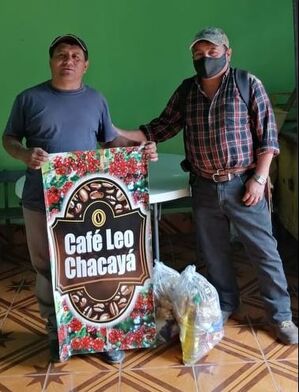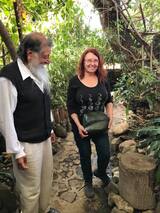
We founded SGDF in 2009 by making contributions to four different microloans through the KIVA.org online lending platform (See https://www.spartanglobalfund.org/.) Kiva works with field partners around the world, who administer loans on-site. In 2011 SGDF expanded its activities by forming a companion 501(c)(3) non-profit organization. The 501(c)(3) enables us to make loans through our own field partners. Between these two channels (KIVA and loans using our own field partners), we have made over $110,000 in loans. As Covid-19 came upon us, we adapted our practices to meet the needs of many of microloan recipients.
This came about because I led a study abroad program to Guatemala during spring break this year. The program complements SGDF, allowing MSU students to learn about the Guatemalan economy, the need for sustainable development, Fair Trade, direct trade, and microfinance. While in Guatemala, we met with entrepreneurs in small businesses who have received microloans through SGDF. We returned to the U.S. on March 9, 2020, only days before borders were locked down because of the pandemic
After we returned, we learned of the hardships facing our microloan recipients. Borders between municipalities were locked down to prevent the spread of Covid-19. Citizens were under a strict 4 p.m. to 4 a.m. curfew. And, with major food shortages and a stifled economy (meaning no income for many people), families resorted to hanging a white cloth from their doors to indicate that they had no food. (See https://www.theguardian.com/global-During the Covid-19 pandemic, Spartan Global Development Fund students at Michigan State University have found ways to be creative and flexible in their service to others. (See www.spartanglobalfund.org.)
Therefore, my students shifted their efforts from fund-raising for microloans to a campaign to make sure that our Guatemalan loan recipients and their families had food. As of October 2020, we have raised over $7,600 for basic food supplies, the majority of which were delivered by August, although fundraising proceeds to meet continuing needs. (See https://www.spartanglobalfund.org/donate to donate or for the current total.) The deliveries, costing about $50 US dollars, provide staples such as rice, oil, corn, and beans. That feeds a family of four for about two weeks. We also delivered small amounts of cash–$100–to some of our Guatemalan loan recipients to enable them to continue to meet basic necessities.
The photos above, taken at the time of the food deliveries, show members of the largest cooperative with which we work: San Antonio de Chacayá community on Lake Antigua, Guatemala. We have a special connection to the farmers and their families because they hosted our education abroad students in March.
Leonzo Vasquez, President of the Chacayá cooperative, responded to the food delivery as follows: “En nombre de los productores, muchas gracias por esa gran ayuda que nos mandaron en espacial a usted y Alós estudiantes mil gracias. “ (In the name of the producers, many thanks for this great help that you sent, especially to you and the students. A thousand thanks.) The farmers of the cooperative added a touch of sweet humor, too, teasing that their Michigan State friends are trying to turn them into Italians. Why? For a recent set of deliveries, beans were not available at the markets, so our on-the-ground partners substituted pasta and cornmeal.
As we became immersed in our fall 2020 semester, SGDF students renewed their focus on micro-finance education (here) and micro-lending around the world (with a focus on Guatemala). Yet, I am proud of them for stepping aside from "business as usual" over these past few months to respond with kindness and compassion toward "our folks" in Guatemala.
Copyright ©2020, by Paulette L. Stenzel, Professor Emeritus, Michigan State University

 RSS Feed
RSS Feed